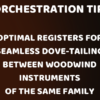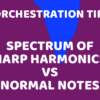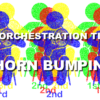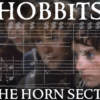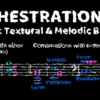This is a special 54th birthday post – a bit of rumination over how I started as a composer, how I’ve seen other composers starting whom I’ve helped over the years, and how crucially important it is that we are all completely and totally ourselves no matter what our gifts may be.
I was musically prodigious as a child. At age 5, I encountered a piano for the first time and desperately wanted to understand it, absorb it, and learn its lessons. By age 8 I was reading orchestral scores, and soon encountered a professional mentor whose example set me on the path toward where I am today. By age 13, I arranged and composed works for solo piano, chamber ensembles, and orchestra. Even at that, I felt that I could have accomplished much more throughout my childhood, if my parents had indulged my talent a bit more. That was the cost of being their child, and the blessing: assuming that if I had some touch of greatness, then I’d just figure it out for myself. They were willing to pay for lessons, but not to reorder their lives to make my artistic aspirations necessarily convenient.
I can’t deny that the experience shaped me into the artist I am today. I make my own opportunities and do my own thing in my own little corner of the world. My attempts to fit into the general plan of larger organisations have largely proved futile, such as applying for grants, awards, fellowships, and so on. The benefits of any organisation that assumes a parental role have been largely lost on my art, including for the most part degree-based education (but that’s just me – not you). And yet situations in which I share artistic responsibility have proved quite fruitful. Bringing my own thing to a table of equals and building projects with feedback and consensus is the cornerstone of my recent career, such as in my longterm position as Education-Composer-in-Residence with Orchestra Wellington.
I relate the above not to toot my own horn, which I generally try to avoid nowadays because I feel an artist’s work should speak for them rather than their bio. Rather, it’s to make the point that I had to work out for myself what kind of artist I was to become. At no time did anyone call me “The Next Mozart,” nor did I aspire to such an identity. I wanted to know who Thomas Goss was artistically – how that person was going to grow, and what surprises lay ahead. Not having great shoes to fill meant that I could determine my own artistic shoe size. I didn’t have to follow a script determined by a previous composer, like writing X piece by Y age. That’s not to say that I didn’t have expectations or disappointments. But I learned to find out who I was when life made a mess of all my perfect plans, which was pretty much constantly for many years.
By age 54, I’ve taught many young musicians in development. Some are prodigies by any definition. I have a student at this time who’s composed and orchestrated beautifully conceived music, and has set his life path as a musician from an early age, as I did long ago. He just turned 12. I would never dare to diminish the great individuality of his talent by calling him “The Next Mozart.” He has a right to figure out who he is, and then attach his name to that manifestation rather than personifying a long-dead, culturally out-of-date man (however great that man’s significance).
This is why I’m so opposed to the current rush of articles written about young composer Alma Deutscher. Not that great talent shouldn’t be acknowledged at whatever age it emerges. But to acknowledge talent simply because it is young reduces art into a kind of sideshow. Prodigy should be recognised, but only alongside quality, beauty, and discipline. And in this regard, Deutscher hasn’t received mass media coverage that truly expressed anything about her art. Discussions of her merit seem limited to the fact that A. qualified adults acknowledge her talent, and B. she’s only 11.
A prime example of the inherent vacuousness of this approach is a Limelight article currently making the internet rounds, “Is this British Wunderkind the next Mozart?” [http://www.limelightmagazine.
And yet the tone of the article is thoroughly predictable, and encourages the reader to focus on the worst presumptions about concert music: that artistic work can be great simply because a child wrote it, and that great artists are appreciative of it. This ignores what art is all about, which is a way to live your life and grow into who you’re meant to be. A musician that is trumpeted too loudly as a prodigy can often be deserted once the spectacle of their youth departs. What’s worse is when a composer is born into the notion of spectacle being the validation of their art because of their prodigy. It makes an unspectacular life in the arts unattractive, even though that is the lot of many very fulfilled and happy artists (and I include myself in that number, whatever my achievements may appear to be from the outside).
The reality of the situation was that even Mozart wasn’t the Mozart that these writers think he was. They are fixed on the little Wolferl of the First Grand Tour, a preadolescent fireball that lived out his childhood on the stages and palaces of Western Europe. That child was a phenomenal performer, but he wrote only encouragingly gifted works along the models of his heroes, like J.C. Bach. His individuality starts to emerge in his early teens, and his immortal works by age 17. That’s still pretty great, but it’s not like Mozart was composing at the level of the Jupiter Symphony or The Magic Flute at age 8. Far from it. What really made Mozart great were the works he wrote while proving that a composer could make a living independent of direct royal patronage, without being a hired musical manservant about the palace like his best friend Haydn. Mozart had to rise to the highest level of musical achievement to prove that truth, and a great deal of that achievement included things that come with the accumulation of information and perspective over decades: wisdom, proportion, deep craft, and a body of existing work that could be built upon. In doing so, he changed the world for every serious concert musician and composer to come.
So to throw Mozart’s name carelessly at every young high-achieving creative musician that emerges is a travesty. And to hold composers to that level of expectation is an injustice to us and any sense of individuality that we may nurture. Let us find our own paths, and fulfil our own expectations. Stop imposing false narratives – especially as you won’t be around to bandage our wounds if we fall from the sky from trying to flap the pair of faulty wings that you pressed onto our shoulders.



